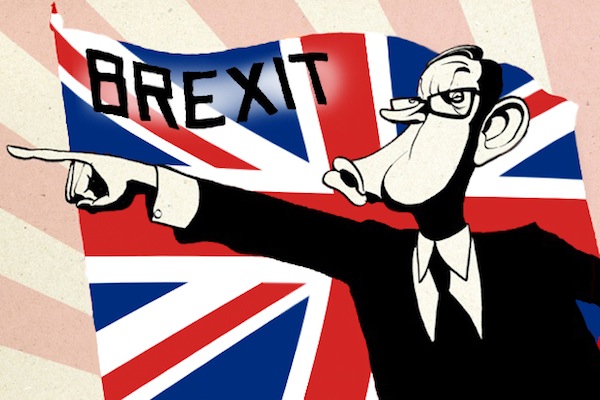By Alison van Diggelen, host of Fresh Dialogues
As the seismic impact of Britains’s vote to leave the European Union rocks the political and financial world, the long term impact is still unclear. But it’s likely that the creation of a new political divide could have incessant repercussions around the world. What does it mean for globalization, and for U.S. presidential candidate, Hillary Clinton?
I was invited to take part in a live discussion on the BBC World Service last night with Simon Long, Banyan columnist for The Economist in Singapore; and Diana Furchtgott-Roth, director of Economics21 in New York.
I see Brexit as part of a larger trend: a widespread shift to nationalism and anti-globalization. It could be the beginning of the end of capitalism as we know it – the majority of Britons have voted against the status quo. Globalization is NOT working for them. In the US, it’s a big wake up call to establishment politics here. Hillary Clinton and the Democratic party need to take note.
BBC host, Fergus Nicholl led a lively discussion on the pros and cons of the Brexit vote. Here is a transcript of the globalization discussion (edited for length and clarity). Listen to the entire podcast at the BBC (Globalization focus starts at 38:38) or below:
Robert Hormats (former Under Secretary for Economic Growth for President Obama and Vice Chairman of Kissinger Associates) explained the U.S perspective:
Robert Hormats: We have a great stake in the global economic system…the global economy has a big effect on our own economy, as it does on other countries’ economies and if we give up that leadership or turn inward, it will hurt our economy…
Laura Trevelyan (BBC Correspondent, Washington D.C.): What can be done to restore economic stability?
Robert Hormats: I think it’s very important that political leaders try to help people who do not feel that they’ve benefited from globalization or from technology, to feel more included, to listen to those people. If these people feel more confident about their own lives, they’ll feel more confident about the global economy…We need to make sure the global economic system works effectively and that is now in jeopardy.
Diana Furchtgott-Roth: I’m fully in favor of globalization, but it doesn’t have to mean that Brussels can control what kind of vacuum cleaner you can buy…The EU has become too intrusive. And that’s why the majority of people voted to leave… not having to do with globalization but intrusion in everyday life…
Fergus Nicholl: Simon, take us into Asia with this issue of globalization…
Simon Long: It’s not just that people are uncomfortable with globalization, they’re uncomfortable with some of the byproducts: increased inequality, entrenched elites making decisions for them. And in that context this (Brexit) vote has resonated in some parts of Asia as a revolt against doing what you’re told is best for you. It’s a phenomenon one’s seen in elections in Indonesia in 2014…in the Philippines with the election of Rodrigo Duterte on an explicitly anti-elite, anti-establishment platform. It’s part of an anti-globalization trend…a general revolt by the people who feel excluded from the elites.
Fergus Nicholl: Alison, you’ve got friends and family back home in Scotland. I wonder how they’ve been reacting over the last few days…
Alison van Diggelen: It looks to me like another referendum on Scottish independence is almost inevitable. I’ve heard anecdotally that some Scots who voted “No” to independence in 2014 are now inclined to vote “Yes” – they don’t want to be part of what they see as an isolationist, xenophobic “little England” mentality.
I see Brexit as part of a larger trend: a widespread shift to nationalism and anti-globalization. It could be the beginning of the end of capitalism as we know it – the majority of Britons have voted against the status quo. Globalization is NOT working for them. In the US, it’s a big wake up call to establishment politics here. Hillary Clinton and the Democratic party need to take note of it and start doing more to address the people who’re not benefiting from globalization and doing something to help them.
Fergus Nicholl: Simon, that’s a very bleak message: a sense of fundamental danger to the global financial system?
Simon Long: I think it’s justified. What we have seen is a big step back to the international order of the past 40-50 years. It does reflect a sense of resentment, not just in the UK, against the EU, but felt around the world, against the current economic system. If one looks at pioneering trade agreements, for example, The Trans-Pacific Partnership, it’s hard to find any country where that’s a popular idea: people think it’s either nothing to do with them or is against their interest. The popular mood has disassociated itself from what governments are doing in globalization.
Read lots more BBC Dialogues and reports from Fresh Dialogues
Politics: Mexicans in Silicon Valley Respond to Trump’s Vitriol
Tech: How to Get More Women in Tech?




